
"Even if grit and sand are found in the rice one eats, we should feel blessed."
By Ding Huaming (2006 intern at Ainong Hui, Liuzhou)We firmly believe that only when we work together with farmers can we eat food that’s truly healthy, and eat with our minds at ease.
“Who would know from the food in one’s bowl: from hard toil every grain grows?” It’s undoubtedly a blessing to be able to eat the organic rice from Heng County. Farmers of Chentang and Sancha in Heng County started to grow organic rice in 2005. After three years of hard work, they became more confident. To encourage other farmers, some pioneering organic farmers formed a farmers’ association. In 2007, the association began building a system to promote organic farming skills and techniques, and to build a CSA development model based on integrity and trust.
In the beginning, because of packaging problems, consumers had a lot of doubts.
In farming households, nothing is left unused. Bags for fertilizer and feed used to be reused as packaging materials. They were used to hold organic rice before the standardised packaging was developed for Heng County rice.
Using bags for fertilizer to hold organic rice ? Consumers were unhappy and doubtful: What does it mean? Isn’t this organic rice ? Aren’t you cheating yourself and others? And you said it’s organic? Aren’t these bags for fertilizer ? Who will believe you ?
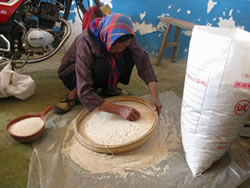
“I can’t speak for others, but I followed every step of the organic method earnestly when I grew this rice.”
“I don’t want to sell (my rice) once only.”
“Whatever you do, reputation comes first. One must practice chengxin, especially when it involves food. If you daren’t eat it yourself, how can you sell it to others? It’s a matter of conscience.”
We wanted to put a small note in the package to provide some information about each farmer, but since it might not have been very hygienic, we simply attach the name of the farmer to the bag. However, volunteers have set up a file for each organic farmer and the information is provided to every consumer who buys our rice.
An old and difficult problem that takes time to resolve: broken rice, and grit and sand !
After the packaging problem was resolved, a new problem arose. From the villages to Pingma Township in Sancha, there was not one machine that could mill rice properly. Though once in a while we may receive an order for as much as a thousand catties, this means little over a hundred catties from each farming household. For convenience and to save money, farmers simply mill the rice in the village mill. Whether due to the sun drying the rice or problems with the milling machine, the grains are often broken, and the milling machines are unable to screen out grit and sand.
“I’ve been eating broken rice all my life! It’s no big deal so long as it tastes good.” Many farmers were offended.
“There might be sand, but there are definitely no stones! I eat it myself. How come I don’t see any?”
“Some of the complaints are exaggerated. There are even rumours there are stones in our rice!”
(Perhaps for consumers sand and stone are the same, but farmers are clear they are different.)
However, we wanted to sell our rice, so we have to give consumers our best.
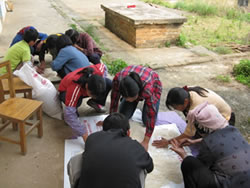 Even if grit and sand are found in the rice one eats, one should feel blessed. One person is too slow, so the whole family joins in. It’s not possible there will still be sand in the rice! |
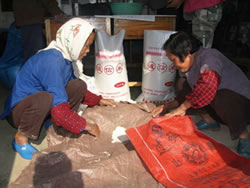 It takes a few hours to fill just one bag of rice. |
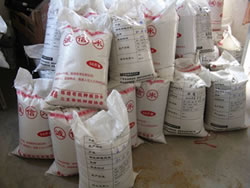 The farmers produce Chengxin Rice with their hearts. |
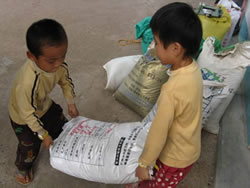 Here in our village nearly everyone takes part in every kind of labour. Even small ones are part of the packaging team. |
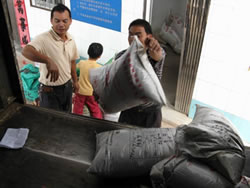 Loading the rice onto the vehicle is like loading up oneself with expectations. |
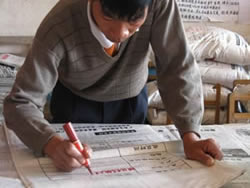 Farmers attach a lot of importance to their reputation. They insist on signing their names on the bags so that consumers will know whose rice they are eating. However it means the association’s supervisor has to help farmers, using his hand which is more used to carrying hoes, to sign their names. It’s a painstaking job. |
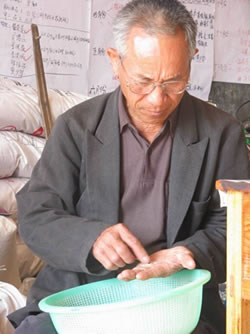 To make sure consumers won’t find washing rice a wearing job, farmers have considered all kinds of ways—reading glasses that have not been used for ages are of use again. With their glasses on, the farmers can see every grit and sand now. |
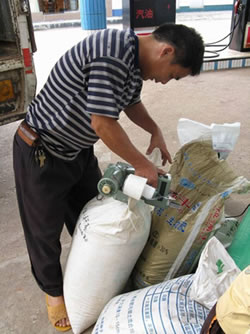 Portable sealing machines are very practical, even though sealing bags is a painstaking job. |
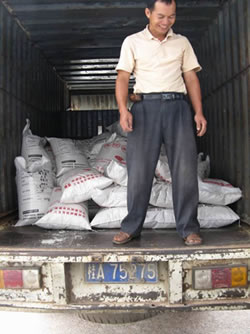 The rice is finally ready for delivery. For the farmers, Chengxin Rice is a healthy food for their own consumption and it makes them happy when consumers are eating the rice they produce. |
From 2007 to today, there have been complaints and we have made a lot of effort to find ways to make improvement. The farmers’ association will hold an urgent meeting whenever they hear a [negative?] opinion from the consumer. We are not afraid of complaints and will not stop making improvements. What we fear most is that consumers might say, “Chengxin, you have no more second chances!” We really hope more friends will give us feedback and suggestions, and give us the time to improve. Farmers of Heng County are enthusiastic and hospitable. They welcome consumers to come to Heng County directly to experience farming and to take part in the harvesting: of chengxin and good health. “Since we started to engage in organic farming, I have been feeling pride in ourselves. Not only are we farmers becoming friends among ourselves, we are also making friends with urban dwellers,” Sister San once said with emotion in an activity for consumers.
Follow-up: we have been making improvements. (To improve milling, farmers of Sancha Village now send all their rice to be milled in Liangqi Township. They have also heard that over there they will be able to produce coarse rice, just as Chentang Village has been doing.)







